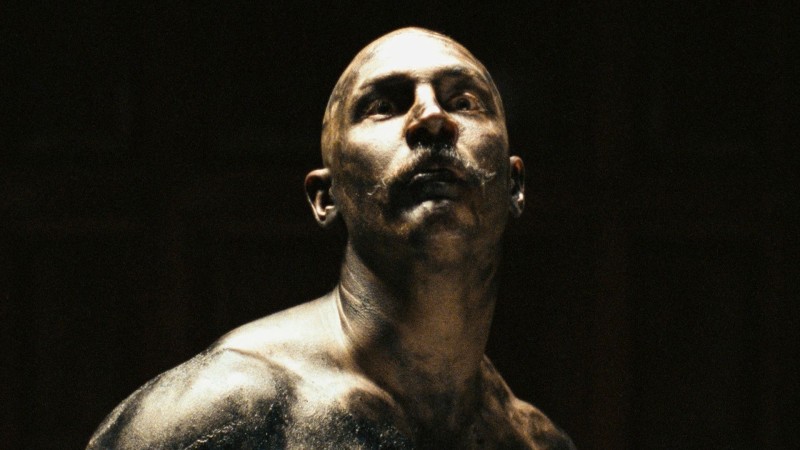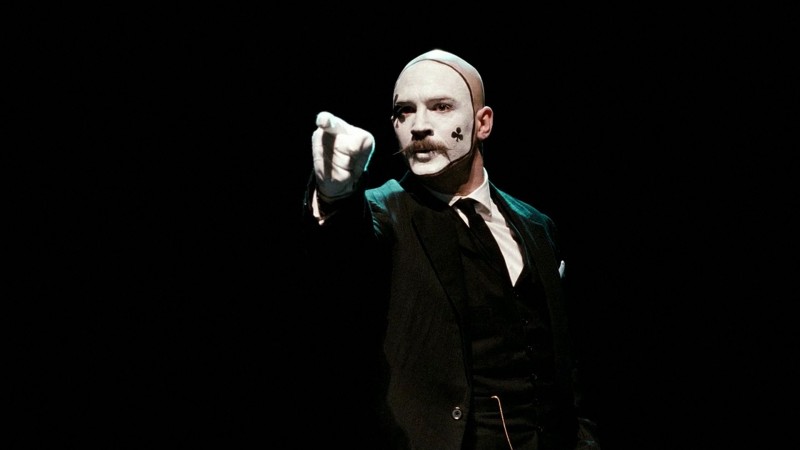




Charles Bronson (the name he took in 1987 and by which he is best known – his birth name was Michael Peterson, and he changed his name again in 2014 to Charles Salvador) has spent the better part of the past 47 years in prison for various violent transgressions, most of which occurred behind bars. For those exploits, he has spent a large portion of his time incarcerated in solitary confinement. A celebrity in the UK both for his ferocious reputation as well as being a notable case study for both sides of a long-standing national debate about prison reform, Bronson seems to inspire the kind of outsized and intense reactions he himself seems incapable of managing.
The biographical crime movie Bronson (Nicolas Winding Refn, 2008) tends to inspire similarly polarised reactions. A tightly-wound theatrical character study, Refn’s ecstatic mythology of the man dubbed “Britain’s most violent prisoner” digs into the fractured mind of someone desperately trying, and failing, to articulate the reasons for his suffering. Like its subject, the film is deliberately provocative, often letting its protagonist speak directly to camera, inviting the audience (itself portrayed as a faceless mass seated in darkness) to dismiss him, his plight, and thus the film as well. But there’s something seductive about Bronson the character, played with vaudevillian charm by Tom Hardy. Just as with the actual Bronson, it’s hard to look away.
I suspect part of the fascination with Bronson is political. A socially maladjusted person hellbent on self-sabotage, Bronson is the kind of irritant guest you don’t want at your dinner table, let alone in society at all. And yet, it’s hard to shake the suspicion that years in solitary confinement contributed to shaping him into the wild man he is today, in which case the state is itself partly responsible for Bronson’s condition. So, what to do? Given the political tumult surrounding Bronson the man, one might expect the film to explore these issues.
But politics are no interest to Refn. What instead draws him to his subject, I suspect, is the opportunity to explore the mind of a man struggling, and failing, to understand himself. Ref depicts the man empathetically, and comes to no clear answers—even with the benefit of a third personal view, Bronson is an enigma, a contradiction, an unsolvable puzzle. The success of the film lies in its ability to make Bronson’s struggle for resolution ours as well, instilling an uneasy feeling in the viewer, raising the possibility that any attempt to articulate ourselves would amount to nothing more than confabulation.

.
Fame and infamy
“My name’s Charles Bronson. And all my life I’ve wanted to be famous,” declares Bronson – his first line of the film. The problem, to hear him put it, is that he lacks the skills conducive to fame – acting, singing, and the like. But acting lessons aren’t a suitable therapy for the kind of violent outbursts to follow. The problem is deeper, lurking in Bronson’s resistance to the male social script – steady job, wife, kids, car, house, and so on. At war with himself over his inherited hetero-normative masculine role, yet unable to find a socially acceptable means for doing so, Bronson’s violent outbursts are the product of a tension he cannot resolve.
It’s not for lack of trying. Throughout, gay men take a keen interest in Bronson, offering him alternative paths to self-actualisation as a bouncer or brawler or artist. But outside of prison, the siren call of the straight life—exactly that outcome Bronson cannot abide—proves overwhelming. A fling with a local girl leads to a misunderstanding (she loves her boyfriend) and Bronson’s fumbled attempt to woo her (robbing a jewellery store) seems more like an act of self-sabotage when it lands him right back in the slammer. Yet what would be a tragic result for anyone else is depicted as a slow-motion victory lap set to Maria Callas’ rendition of Verdi’s La Forza Del Destino (“The Force of Destiny”, in free translation), suggesting a twisted homecoming of sorts.
Home again, so to speak, Bronson finds a temporary outlet in outsider art, but when that starts to garner positive attention from prison officials (and a possible release date), his irrepressible compulsion to avoid social conformity leads again to self-destruction. Taking his art teacher hostage and painting him in the likeness of Salvador Dali (a nod to the real Bronson’s name change in 2014) makes for a prank just intimidating enough to warrant another extended round of solitary confinement and a wiping clean of any goodwill accumulated through social conformity.
The film concludes with a title card informing us that Bronson has spent 34 years in prison, 30 of them in solitary confinement, ending on a slow tracking shot backwards revealing a bloodied Bronson locked in a cage lacking room even to sit down. It’s a shocking and horrific image, underscoring the tragedy of a character so pathologically repressed that reprieve is found only locked away and forgotten.
.
Comfort in suffering
Curiosity is our natural condition, and we can’t help but labour under the presumption that the world is by and large sensible. That things just don’t make sense isn’t a comforting thought, so we lock it away, out of sight. Bronson forces the incoherent into the spotlight (literally), giving it a voice and persona and a hushed audience over which to pontificate. And we must endure it, not because some sadistic director has deemed it so, but because deep down we suspect we are wrong—that things can’t be made sense of—and we won’t know ourselves until we face this truth.
How we react to this brutal confrontation with the inexplicable varies, the only constant being that some emotional reaction is warranted, and likely. Some of us might be sickened by it, resentful towards Refn for forcing it upon us. Others might attempt to sublimate their reaction by transferring their feelings to the nearby political issue. And others still may mock the overt formalism of the craft used to engage us (direct address, metafictional audience laughter, prolonged stilted silences, synth-pop score). But rather than deflect our pain elsewhere, Refn wants us to sit, uncomfortably, in the incoherence and suffering of his character, without attempting to rationalise or prescribe treatment for it. It is in this confrontation with the inexplicable that we may better understand ourselves (the way the brave soul embodies his virtue when confronting fear) as well as appreciate being free enough from such incoherence to live relatively flourishing lives.

.
Liberation through the absurd
Though our confrontation with the absurd is painful, it may also yield the opportunity for renewal. Writing about the story of Abraham, Kierkegaard noted that, by agreeing to sacrifice his son Isaac at God’s command, “Abraham is at no time a tragic hero but is something entirely different, either a murderer or a man of faith” (Fear and Trembling, 57). Abraham’s choice to betray his highest moral principles out of religious faith is terrifying in its absurdity, yet at the same time strangely compelling.
For Kierkegaard, in acting out of faith in the face of absurdity, Abraham represents the possibility of transcending the rational and the ethical—and it is in such an act where Kierkegaard surmises we may find renewal (since, at the last moment, God replaces Isaac with a lamb). Like Bronson, we are gripped by incompatible desires – to understand everything and to transcend the need for understanding. And yet, like Bronson, confronting this incoherence is agony. The opportunity to free ourselves of the confines of unchosen rational and ethical modes of existence is thus one explanation of the appeal of the absurd.
To move beyond our condition requires faith, according to Kierkegaard. I’m not so sure. To have faith enough to act against one’s own principles seems merely to add more incoherence on top of a situation that’s messy enough as it is. An alternative possibility is to honestly embrace the incoherence. The mere act of grappling with the inexplicable may itself be a kind of therapy for otherwise unrelenting demands for understanding. I suspect this struggle may last a lifetime, but if that is to be our plight, we ought to face it openly and honestly and without judgement, just as we should the story of one Charles Bronson.
.
All images on this article are still from Nicolas Winding Refn’s ‘Bronson’





















